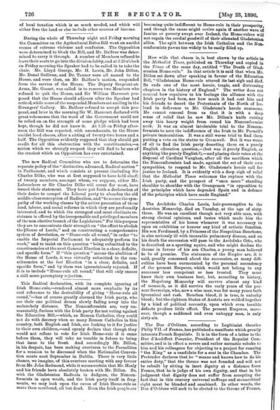This Radical declaration, with its complete ignoring of Irish Home-rule,—rendered
almost more emphatic by its cool reference to the desirability of giving "Home-rule all round,"—has of course greatly alarmed the Irish party, who see their one political dream slowly fading away into the melancholy distance. The Nonconformists are, very un- reasonably, furious with the Irish party for not voting against the Education Bill,—which, as Roman Catholics, they could not do with decency when so many Roman Catholics in this country, both English and Irish, are looking to it for justice to their own children,—and openly declare that though they would not refuse to vote for Irish Home-rule if it came before them, they will take no trouble in future to bring that issue to the front. And accordingly Mr. Dillon, in his despair, has been making overtures to the Parnellites for a reunion to be discussed when the Nationalist Conven- tion meets next September in Dublin. There is very little chance, we imagine, of this overture meeting with any favour from Mr. John Redmond, while it seems certain that Mr. Healy and his friends have absolutely broken with Mr. Dillon. So, with the Gladstonian Radicals in dudgeon, the Noncon- formists in open wrath, and the Irish party itself in frag- ments, we may look upon the cause of Irish Home-rule as more than moribund, all but dead. Even the Irish people are
becoming quite indifferent to Home-rule in their prosperity, and though the cause might revive again if another wave of famine or poverty swept over Ireland, the Home-rulers will not regain the cordial goodwill of their alienated Gladstonian allies. The split between the Irish Catholics and the Non.- conformists yawns too widely to be easily filled up.


































 Previous page
Previous page